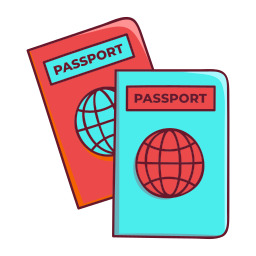Traveling by ferry from Tortola to Anegada takes about 50 minutes and covers approximately 28 nautical miles across the British Virgin Islands. Ferries on this route operate just 3 to 6 times per week, so advance planning is essential. Ticket prices typically start from around $100 one way. Despite the limited schedule, this ferry is the most direct and affordable way to reach Anegada’s secluded beaches and unspoiled charm.
.png)

Can you not find what your looking for? Let us know and we will do the work to get it added!
Check out the ferry schedule below to see when ferries are operating between Tortola to Anegada.



.png)


Thinking of visiting Anegada from Tortola? You’re in for something special. Unlike the steep, green peaks of the other Virgin Islands, Anegada is a flat coral island—unique in both landscape and atmosphere. Getting there is part of the adventure, and the Tortola to Anegada ferry is the most direct and affordable way to reach this remote paradise.
The ferry ride takes about 50 minutes and covers roughly 28 nautical miles across the turquoise waters of the British Virgin Islands. While this is one of the longer inter-island ferry journeys in the BVI, it’s smooth, scenic, and far easier than chartering a private boat or taking a small plane.
Ferries to Anegada operate just once or twice per day on selected days of the week, so advance planning is essential. This isn’t a hop-on, hop-off route like the ferries to Jost Van Dyke or St. John. Instead, you’ll want to check the Anegada ferry schedule carefully and secure your tickets early—especially if you’re visiting during peak travel season or planning a day trip to Anegada.
Because departures are limited, it’s best to arrive at the dock at least 30 minutes before departure to check in and board without stress. Missing your sailing could mean waiting days for the next one, so punctuality really matters here.
Tickets for the Tortola to Anegada ferry typically start at around $100 one way. Some operators may offer small discounts on round-trip fares, but most travelers choose to book both directions in advance to guarantee their return journey. While this ferry is more expensive than shorter BVI routes, it’s still far cheaper and more convenient than flying.
When you step off the ferry, you’ll immediately notice how different Anegada feels compared to the rest of the Virgin Islands. With its low-lying landscape, endless beaches, and quiet charm, the island offers a refreshing contrast to the busier ports of Tortola and Virgin Gorda.
Anegada is world-famous for:
Taxis and rental jeeps are available near the ferry dock, making it easy to get around and explore.
While the Tortola to Anegada ferry requires more preparation than other inter-island trips—with limited departures, a longer crossing, and higher ticket prices—it’s also one of the most rewarding. For those who plan ahead, the ferry unlocks access to one of the BVI’s most untouched and breathtaking destinations.
Whether you’re visiting for the day or staying overnight, Anegada is a true hidden gem, offering tranquility, natural beauty, and a slower pace of life that feels worlds away from anywhere else in the Caribbean.
.jpg)


Visitors to the British Virgin Islands (BVI) may not require a visa, depending on their nationality. Nationals from countries such as the United Kingdom, United States, Canada, and members of the European Union are typically exempt from obtaining a visa for short stays. However, travelers from other countries may need to apply for a visa before arrival. It's essential to verify the specific entry requirements based on your nationality and travel purpose. For the most accurate and up-to-date information, consult the official BVI government website or contact the nearest BVI consulate or embassy.
To visit the U.S. Virgin Islands (USVI), travellers must adhere to U.S. entry requirements, as the USVI is a U.S. territory. Nationals from countries participating in the U.S. Visa Waiver Program (VWP) can enter without a visa for up to 90 days for tourism or business purposes. Other travellers may need to obtain a U.S. visa before arrival. It's essential to check the specific entry requirements based on your nationality and travel purpose. For the most accurate and up-to-date information, click the button below
Learn More
When traveling to the U.S. Virgin Islands (USVI) or the British Virgin Islands (BVI), you may be asked to provide additional documents at immigration. This can include proof of onward or return travel, confirmation of accommodation or a yacht charter booking, and evidence of sufficient funds to cover your stay. Having these documents ready helps ensure a smooth entry and demonstrates that you meet the territories’ entry requirements.

All travelers to the British Virgin Islands (BVI) must complete a Customs and Immigration declaration form online within 72 hours before arrival. This can be done at https://bviedcard.gov.vg/en. Submitting the form in advance helps streamline your entry process and ensures compliance with BVI immigration requirements.
Fill In FromHere are some of the most frequently asked questions about routes and ferry operations in the Virgin Islands. Can’t find what you’re looking for? Feel free to ask your question at the bottom.
Most ferry operators do not offer mobile check-in. This means you’ll usually need to check in at the operator’s desk at the ferry terminal or dock, or occasionally on board.
For international ferries, you must check in at the operator’s desk before passing through security and boarding. For domestic ferries, most operators do not require you to check in at the desk; instead, your ticket is usually checked either at boarding or once the ferry is under way.
Unfortunately, ferry ticket prices tend to remain the same. There are no peak or off-peak fares, and operators don’t regularly adjust their prices to compete with one another. However, you may find that one operator is slightly cheaper than another on the same route.
The ferries are generally very reliable, as operators understand they provide a vital service connecting the islands. On the rare occasion that a ferry is cancelled or delayed, operators will usually work to find a solution that minimises disruption to passengers.
Domestic Ferries (within the BVI or USVI):
For local routes such as Tortola to Virgin Gorda or St. Thomas to St. John, arriving at the ferry dock about 30 minutes before departure is recommended. This gives you time to purchase your ticket (if you haven’t booked online), check luggage, and board comfortably. Many ferries use first-come, first-served seating, so arriving a little earlier may help you secure a better seat.
International Ferries (between the BVI and USVI):
For routes like St. Thomas to Tortola or Virgin Gorda to St. Thomas, plan to arrive at the terminal at least 60–90 minutes before departure. Check-In for international ferries close 20 minutes before the scheduled departure time. International ferry check-in often involves:
Allowing extra time ensures you won’t miss your ferry, especially during peak travel seasons when lines are longer.
Yes, you can buy ferry tickets directly at the dock in both the British Virgin Islands (BVI) and U.S. Virgin Islands (USVI). For most routes, ferries are rarely sold out, and even if one boat is full, there’s usually another departure within a couple of hours.
While many operators now allow online booking, buying at the dock is often more flexible. That’s because tickets are not interchangeable between ferry companies. If your booked ferry is delayed or canceled, you may need to purchase a new ticket with another operator and then request a refund for your original one — which can take time.
Our advice:
If you’re flying into St. Thomas (STT) and need to catch a ferry to the British Virgin Islands (Tortola, Virgin Gorda, Jost Van Dyke, or Anegada), it’s important to plan ahead. Ferries from St. Thomas to Tortola (Charlotte Amalie or Red Hook to Road Town or West End) typically stop running by late afternoon. Because of this, we recommend booking your flight to arrive as early in the day as possible, giving you a comfortable window to clear customs, collect luggage, take a taxi to the ferry terminal, and catch your boat.
If your flight arrives too late to make the last ferry, you may need to overnight in St. Thomas and continue the next morning.
For domestic ferries within the BVI (like Tortola to Virgin Gorda) or within the USVI (St. Thomas to St. John), you’ll usually have more flexibility. These routes often run later into the evening, so you’re less likely to miss your connection.
Yes, most ferry operators in the Virgin Islands allow passengers to bring their own snacks, food, and non-alcoholic drinks on board. This applies to both domestic ferries within the BVI or USVI and international ferries between the two territories. Some ferries also sell light refreshments, but options can be limited, so it’s a good idea to bring water or snacks, especially on longer routes like St. Thomas to Tortola. Alcohol is generally not permitted, and if you are traveling internationally, keep in mind that certain food or drinks may need to be declared at customs. Always dispose of any trash properly or take it with you when you disembark.
Yes, most ferry operators in the Virgin Islands allow passengers to bring large or oversized items such as surfboards, dive bags, or professional equipment cases. These items are usually checked and stored separately from standard luggage, and there is often an additional fee depending on the size and type of gear. Charges can vary by operator, so it’s best to review the details when booking your ticket or check with the ferry company directly before you travel.
On most domestic ferry routes within the Virgin Islands, infants usually travel for free, while children require a child ticket at a reduced price compared to adult fares. For international ferries between the BVI and USVI, infants often do not travel free because government taxes and port fees still apply, even for very young passengers. It’s always best to confirm the fare policy with your ferry operator in advance, as rules can vary slightly by route and company.
Yes, on most routes you can pay for ferry tickets with a credit card either at the ticket office or, in some cases, onboard the ferry. However, it’s important to know that card machines are not always reliable in the Virgin Islands, and if the system is down you may need to pay in cash instead. For this reason, we recommend always carrying enough cash as a backup. Most ferry operators accept Visa and Mastercard, but American Express is often not accepted, so plan accordingly when arranging payment.
Unfortunately, most ferries in the British Virgin Islands and U.S. Virgin Islands are not fully wheelchair accessible. Dock heights vary from island to island, and the fleets include both older and newer vessels, making consistency difficult. Some operators will do their best to assist passengers with mobility challenges, but boarding may still require being lifted or helped onto the ferry. If you or someone in your group uses a wheelchair, it’s best to contact the ferry operator in advance to discuss options and make arrangements, or to consider alternative transport if accessibility is a priority.
Yes, ferries in the Virgin Islands can be cancelled due to weather, though it is relatively uncommon. The vessels are designed to handle rougher sea conditions, and operators work closely with the Coast Guard to monitor forecasts days in advance. If a cancellation is likely, most ferry companies will notify passengers at least a day or two ahead of time rather than at the last minute. Sudden cancellations are rare, but always allow for some flexibility in your travel plans during hurricane season or periods of rough seas.

If you can’t find the answers to your questions, get in touch and we will do our best to provide the information you need.
